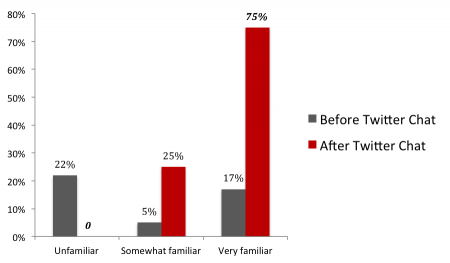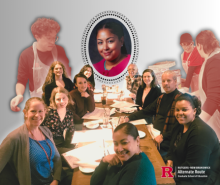Teachers Model Growth Mindsets in Twitter Ed Chat
Ensuring teachers are comfortable using edtech tools and social media for professional purposes has become a top priority for the Alternate Route program this year. At the start of the year, we co-hosted #SatChat, an internationally renowned Twitter ed chat. Over 200 teachers from our current cohort participated. In March, social media and technology were prominently featured at our statewide conference for Alternate Route Teachers. We’ve also released multiple articles promoting teachers’ use of education technologies and social media to engage students.
Some teachers in our program have been testing the Twitter waters by tweeting about education topics at the start of class. Last weekend, we immersed our entire cohort of new teachers in a facilitated discussion on Growth Mindsets via Twitter. We tweeted viewing materials, then asked a series of questions related to growth-mindsets.
Here are some highlights from our #growthmindset Twitter chat:
#rugsear #growthmindset pic.twitter.com/dM8CivPM7X — AlternateRoute (@RutgersAltRoute) April 17, 2015
We feel fixed mindset has a negative stigma, so do we avoid answering truthfully to receive #growthmindset rating? #rugsear — Antonio Luell (@akluell) April 18, 2015
Q1 Students need to be aware that they are in charge of their own intelligence. #growthmindset #rugsear @RutgersAltRoute — Jennifer McKeever (@msjenmckeever) April 18, 2015
(1/2) A4 Ss tracked low- example: I have Ss who've been placed at lowest level and thought they were dumb until ...#growthmindset #rugsear — Anthony Lodato (@anthonylodato) April 18, 2015
(2/2) A4 I gave them Chaucer in middle english. Their weaknesses became strengths and Ss reading college material #growthmindset #rugsear — Anthony Lodato (@anthonylodato) April 18, 2015
Overcoming fear of risk taking... not so easy when coming from dysfunctional and unstable home #rugsear #growthmindset — Dr P (@rpp88) April 18, 2015
@RutgersAltRoute #rugsear #growthmindset Great session. Learned where I am and where I want to be. — Debra Embert (@d_embert) April 18, 2015
Feedback on the Twitter chat was overwhelmingly positive
The vast majority of participants thought they were very familiar with research on the topic of growth mindsets after participating in the Twitter chat. One teacher wrote in his feedback, “Very fast paced and perfect for the modern teacher.” Another wrote, “This was one of the best sessions of the entire PHASE 3 [course].”
There were still a handful of teachers, though, who were not as comfortable as others using Twitter to engage in discussion. One teacher wrote in her feedback: “This was my first time tweeting–and I think I enjoyed it by the end of the conversation. I do miss seeing everyone face-to-face. Online is no substitute for Dr. J’s [the instructor’s] warmth and humor in class.” As to be expected when using technology, a handful of participants also experienced technical difficulties. One wrote in his feedback: “Using Twitter is frustrating. Although my tweets ‘posted’, I did not see them in the list. Many comments were very good, and I would benefit from more time thinking about them.”
Despite the minor technical difficulties faced by a small number of participants, overall our teachers enjoyed using Twitter as a medium for discussion and, more importantly, indicated increased knowledge of the presented topic.

Hopefully our experimental use of Twitter ed chat can further demonstrate social media's value for the education community. With support from instructors Dr. Phyllis Bivins-Hudson, Dr. Tammy Bowling-Jenkins and Ms. Darci Sosa we successfully adapted our session's content to the Twitter ecosystem. And with inspiration from Dr. Robert Zywicki, a trailblazer in the area of Twitter for teaching and learning, we envision continued use of social media to help teachers enhance their teaching practice, engage in professional development and expand their professional learning network. It’s high time that more teachers adopt a growth mindset toward social media and embrace its possibilities for connecting with national, and even global, professional learning communities.

 Heather Ngoma has over 25 years of experience collaborating with educators across New Jersey to drive education innovation. She currently serves as the Director of the Rutgers-GSE Alternate Route Program in the Department of Learning and Teaching, a program which helps career changers, recent college graduates, and other aspiring education professionals become licensed teachers in New Jersey. Follow her on Twitter @heatherngoma.
Heather Ngoma has over 25 years of experience collaborating with educators across New Jersey to drive education innovation. She currently serves as the Director of the Rutgers-GSE Alternate Route Program in the Department of Learning and Teaching, a program which helps career changers, recent college graduates, and other aspiring education professionals become licensed teachers in New Jersey. Follow her on Twitter @heatherngoma.



